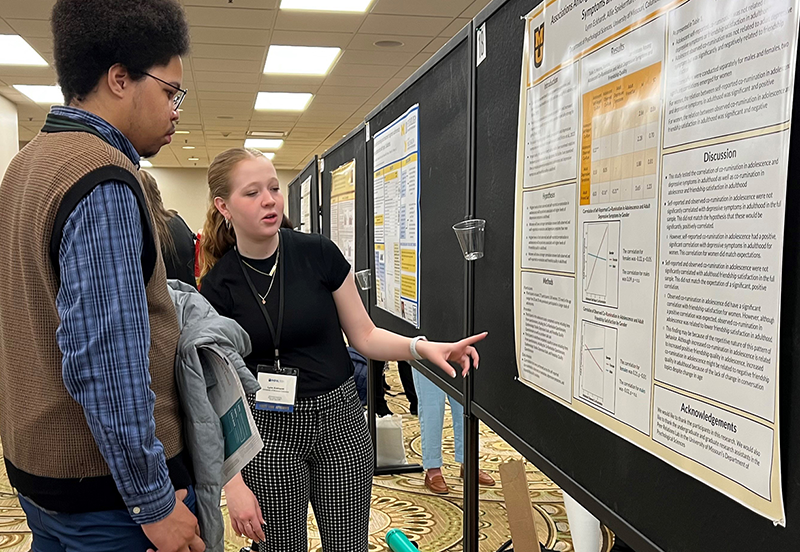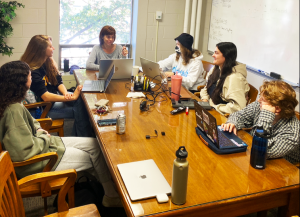
Undergraduate students at the University of Missouri who participate in the Close Relationships research project study how youths’ interactions with close relationship partners shape their development and emotional adjustment. Students approach the study of relationships from a lifetime perspective – with a primary focus on childhood and adolescence.
It’s a project that has been ongoing since 2017 and is led by Amanda Rose, a professor of psychological sciences, and Ashley Groh, an associate professor of psychological sciences. The research was born out of a different project that Rose and Groh were co-supervising with a doctoral student focused on conversations between teenage friends.
“In our first project with our ASH students, and subsequent projects, we’ve worked to teach the students to take on some tasks that are most often done by graduate students, including data collection and data analyses,” Rose said. “We’ve definitely grown in different ways over time. I think the most important way we’ve changed is that we’ve been able to increase our focus on the ASH students’ interests and research questions as they have become more familiar with the content of the research that we do. It’s been exciting to see how the projects have evolved over the years.”
Jordan Booker, an assistant professor of psychological sciences, and Nicole Campione-Barr, a professor of psychological sciences, also serve as faculty mentors on the project.
Close Relationships is one of five research projects within the ASH Scholars Program, which includes research teams based in the arts, social sciences and humanities (ASH) disciplines. ASH Scholars receive a $3,000 scholarship, disbursed in four equal parts over the academic year.
The ASH Scholars Program is a collaboration between the Honors College and the MU Office of Undergraduate Research. While the Honors College plays an important role in the program, students do not have to be pursuing the Honors Certificate to participate. Students of all academic majors and grade levels are invited to get involved.

“It’s been rewarding to be part of the ASH Scholars Program,” Rose said. “Our involvement with the ASH Program has definitely facilitated our work. Early on, we needed supplies and help with conducting the studies, and, through the program, we were able to complete the project. It’s been a great partnership.”
Data collection is a central part of the Close Relationships research projects. Youth volunteers come into the lab, fill out surveys and take part in conversations with a friend. Rose said that the ASH students have been involved in collecting data from 100 pairs of friends and have played an important role during each step of the process.
“Our students greet our volunteers and make sure they’re comfortable,” Rose said. “They also help the volunteers get orientated for the surveys and discussion. In an earlier project, we applied psychological sensors that the participants wore during the conversations, and the students helped throughout that process.”
After collecting the data, students begin to transcribe the conversations for the coding process. The coding team includes a handful of undergraduate students, plus faculty and doctoral students. One goal of the coding is to determine how supportive the friends are toward one another.
“Coding is a very complex and time-consuming process, as it’s important that the coders are seeing the interactions in the same ways to get the same codes,” Rose said. “We’re teaching the students how to analyze data, which is pretty unique for undergraduate research assistants. Sometimes students who participate in research are only able to collect the data and don’t have the opportunity to see how that data is used.”
Some of the more senior ASH students have been able to present their findings on the Mizzou campus and at regional conferences. Rose said having the students participate throughout the entire research process has been one of the most exciting parts of the ASH Scholars Program.
“I think it’s very important that our students have the opportunity to take part in all of the stages of research,” Rose said. “They’re collecting the data, transcribing, coding, helping to analyze the data and creating presentations to share their findings. It’s remarkable to see that progression and growth within the cohorts.”
Rose added that working as part of a team is also a big benefit of the ASH Scholars Program.
“Team science is increasingly common,” Rose said. “With research, some problems are always going to come up. That happens, not because the researchers are doing something wrong, but because it’s the nature of discovery. When those problems arise, you must be able to resolve them, especially when working in a team setting.
“Whether the students decide to pursue graduate school or go in a completely different direction, the skills they learn through this work is so important. Our students are developing their own hypotheses, honing their problem-solving abilities, working with others and presenting complicated topics clearly. Those are all skills that will serve them well no matter the field they pursue.”
While the Mizzou students benefit from being part of the Close Relationships team, Rose said that there have been many positives from serving as a faculty advisor for the team.
“It can definitely be tough as faculty are oftentimes spread very thin,” Rose said. “It’s tough to take on another project; however, it has been rewarding to help the students find their passions. We all benefit at the end of the day.”